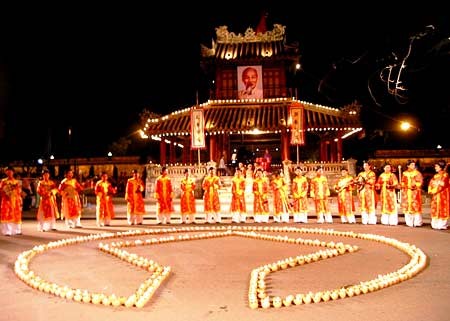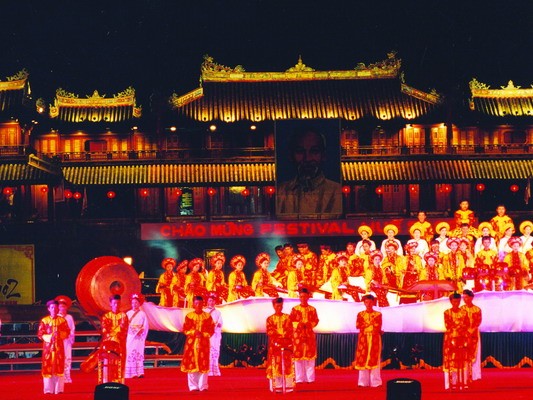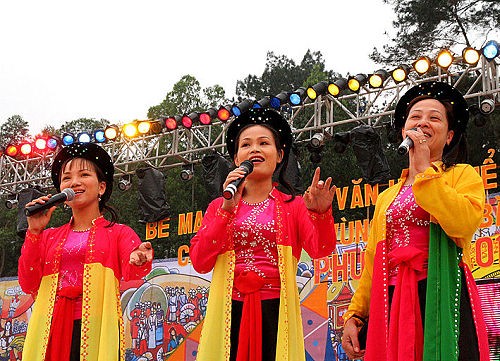(VOVworld)- “International integration has become a popular phrase in Vietnam in recent years”. At the 4th International Workshop on Vietnamese studies held recently in Hanoi, Vietnam’s cultural integration was a major agenda item.

Hue Festival |
Director of the Research Institute of Oriental Culture Doctor Pham Duc Duong elaborates on the development of Vietnamese culture. “In Vietnamese history, culture was decisive in national construction and defense. Nowadays, in modern life, culture plays a significant role as the spiritual background serving national development. We need to pay attention to culture in enhancing social and technological development and the market mechanism for national development. During Vietnam’s international integration, culture motivates and regulates the development ensuring its sustainability”, said Doctor Duong.
Vietnam with 54 different ethnic groups boasts cultural diversity and richness. Each ethnic group, each region has its own cultural identity which enhances Vietnam’s attraction for researchers. Doctor Lukas Parker, a lecturer at RMIT University in HCM City has been in Vietnam since 2008. He says he is most impressed with the celebration of traditional lunar New Year in Vietnam. “I chose to study Tet because as a new comer to Vietnam, I believe that by studying Tet, I can get some insight into many aspects of Vietnamese culture and society. Tet is very complex. And if we study Tet, we can learn many other parts of Vietnamese life. One of the thing that I found as part of my study of Tet was “cúng xóm” or hamlet worship which takes place in HCM City”, said Lukas.

Nha Nhac- Hue Royal Court Music |
In the last decade, the number of officially recognized Vietnamese tangible and intangible cultural heritages has increased. They include Nha Nhac or Hue Royal Court Music, the Central Highlands’ gong, Quan Ho folk duets and Ca Tro folk singing. In late 2011, Xoan singing was recognized as an Intangible Cultural Heritage in Need of Urgent Protection by UNESCO. Vietnamese culture in general and Vietnamese cultural heritages have seen positive changes since they became known to the world. Director of the Cultural Research Institute Doctor Le Hong Ly says: “When tangible and intangible cultural values are recognized internationally, Vietnam and Vietnamese cultural values become more familiar to the world and localities owning the heritages feel prouder. These are positives that encourage the community to preserve and promote their values. The recognition helps Vietnamese culture integrate into the world”.
Doctor Natalia Kraevskaia of the Moscow Institute for Oriental Cultural Research has studied Vietnamese culture and contemporary art since 1983. She says the uniqueness of Vietnamese contemporary art has kept her in Vietnam and inspired her to learn more about it. Dr. Kraevskaia has displayed Vietnamese contemporary art at exhibitions overseas since 1990. She says: “It’s a very complex issue in the process of integration. I think in fact, it should not be very strong integration. Every culture has to keep it from disappearing. But it must be known to the foreign culture. It can be accessible for the foreign culture as well. It shouldn’t totally integrate and disappear. It must keep all its traditional features or its national features”.
According to Natalia, Vietnamese people are finding more opportunities to study and work overseas and there are now many Vietnamese artists living abroad. These are the great opportunities for Vietnam to share its culture with the world.

Xoan singing |
In recent years, Vietnamese culture has strongly integrated into the world’s culture. This has been reflected in an increasing number of cultural exchanges and events promoting Vietnamese culture to international friends. However, the integration has also brought Vietnamese culture the challenge of integrating without getting dissolved by the process.
Le Phuong